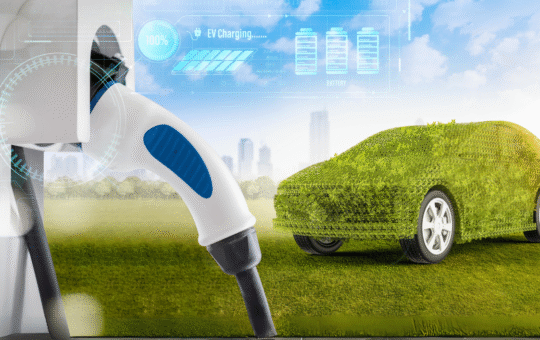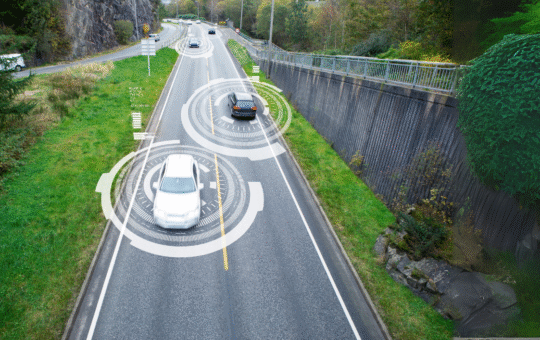
Level 2 Award in Introduction to Autonomous and Driver-Assistance Technologies
- Gain an understanding of the core technologies behind autonomous and driver-assistance systems.
- Learn how these systems enhance vehicle safety, performance, and driving experience.
- Build foundational knowledge for advanced studies in autonomous vehicle engineering.
- Explore emerging career opportunities in the growing field of autonomous driving technologies.
- Understand the principles of autonomous and driver-assistance systems (ADAS).
- Identify key components and sensors involved in autonomous vehicle technologies, including LiDAR, radar, and cameras.
- Gain insights into how these systems improve vehicle safety, navigation, and automation.
- Explore the regulatory, ethical, and practical considerations in autonomous vehicle development.
- Introduction to Autonomous Vehicles
- Basic concepts of autonomy in vehicles, from level 0 to level 5.
- Overview of self-driving cars and their potential impact on the future of mobility.
- Driver-Assistance Technologies (ADAS)
- Key features of ADAS, including adaptive cruise control, lane-keeping assistance, and automated parking.
- Role of these technologies in enhancing safety and reducing driver workload.
- Sensors and Systems in Autonomous Vehicles
- Overview of the sensors that power autonomous systems, including cameras, LiDAR, radar, and ultrasonic sensors.
- How these sensors work together to create a comprehensive view of the vehicle's environment.
- Ethical and Regulatory Issues in Autonomous Vehicles
- Legal and ethical considerations for autonomous driving.
- Understanding safety regulations, liability, and public acceptance of autonomous technologies.
- Pursue further studies in Level 3 or Level 4 courses focused on autonomous vehicle engineering or ADAS.
- Explore roles in vehicle design, testing, or development of autonomous and ADAS systems.
- Work with OEMs, tech companies, or regulatory bodies developing or implementing autonomous technologies.
- Cutting-Edge Curriculum: Stay ahead of the curve with up-to-date knowledge on autonomous vehicle technologies.
- Practical Learning: Gain insight into the real-world applications of driver-assistance and autonomous systems.
- Expert Instructors: Learn from professionals working in the rapidly evolving field of autonomous driving.
- Globally Recognized Qualification: Enhance your credentials in a highly sought-after area of automotive engineering.
Study Units
- Introduction to Autonomous Vehicles
- Basic concepts of autonomy in vehicles, from level 0 to level 5.
- Overview of self-driving cars and their potential impact on the future of mobility.
- Driver-Assistance Technologies (ADAS)
- Key features of ADAS, including adaptive cruise control, lane-keeping assistance, and automated parking.
- Role of these technologies in enhancing safety and reducing driver workload.
- Sensors and Systems in Autonomous Vehicles
- Overview of the sensors that power autonomous systems, including cameras, LiDAR, radar, and ultrasonic sensors.
- How these sensors work together to create a comprehensive view of the vehicle’s environment.
- Ethical and Regulatory Issues in Autonomous Vehicles
- Legal and ethical considerations for autonomous driving.
- Understanding safety regulations, liability, and public acceptance of autonomous technologies.
Upon completing this award, learners will:
- Understand the principles of autonomous and driver-assistance systems (ADAS).
- Identify key components and sensors involved in autonomous vehicle technologies, including LiDAR, radar, and cameras.
- Gain insights into how these systems improve vehicle safety, navigation, and automation.
- Explore the regulatory, ethical, and practical considerations in autonomous vehicle development.
This award is designed for individuals interested in exploring the rapidly evolving field of autonomous and driver-assistance technologies. It is ideal for:
Aspiring Automotive Engineers
Those looking to build a foundation in autonomous vehicle systems and ADAS to pursue a career in vehicle design or technology development.
Current Automotive Technicians
Professionals wanting to specialize in the growing area of driver-assistance systems and autonomous vehicle technologies.
Technology Enthusiasts and Innovators
Individuals passionate about emerging automotive technologies, looking to gain knowledge on the latest trends in self-driving and semi-autonomous vehicle systems.
Vocational Students
Students in automotive or engineering fields wishing to add specialized knowledge on autonomous driving technologies to their skill set.
Professionals in the Automotive or Tech Industry
People working in automotive, manufacturing, or tech industries who want to understand the role of autonomous systems and sensors in modern vehicles.
Our assessment process is designed to ensure every learner achieves the required level of knowledge, skills, and understanding outlined in each course unit.
Purpose of Assessment
Assessment helps measure how well a learner has met the learning outcomes. It ensures consistency, quality, and fairness across all learners.
What Learners Need to Do
Learners must provide clear evidence that shows they have met all the learning outcomes and assessment criteria for each unit. This evidence can take different forms depending on the course and type of learning.
Types of Acceptable Evidence
Assignments, reports, or projects
Worksheets or written tasks
Portfolios of practical work
Answers to oral or written questions
Test or exam papers
Understanding the Structure
Learning outcomes explain what learners should know, understand, or be able to do.
Assessment criteria set the standard learners must meet to achieve each learning outcome.
Assessment Guidelines
All assessment must be authentic, current, and relevant to the unit.
Evidence must match each assessment criterion clearly.
Plagiarism or copied work is not accepted.
All learners must complete assessments within the given timelines.
Where applicable, assessments may be reviewed or verified by internal or external quality assurers.
Full learning outcomes and assessment criteria for each qualification are available from page 8 of the course handbook.
Top Courses
No results found.
Related Courses
Let's Get in touch
Deleting Course Review
Course Access
This course is password protected. To access it please enter your password below:



